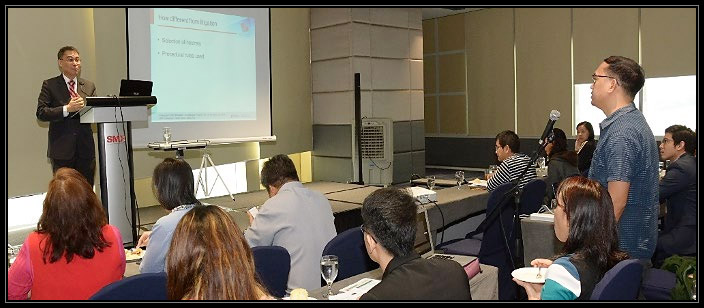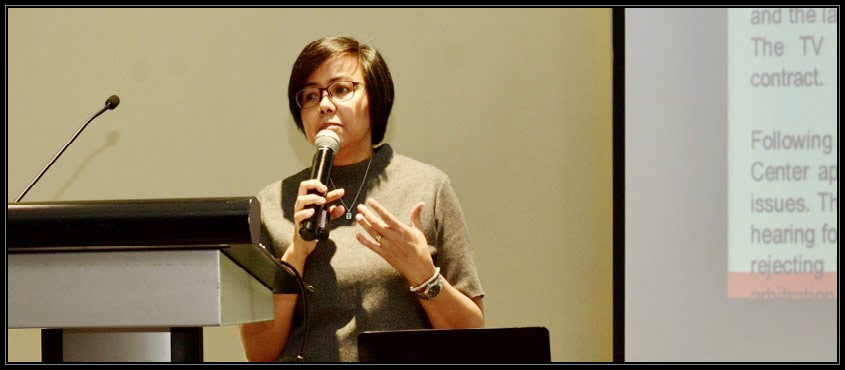
PDRCI has collaborated with the Intellectual Property Office of the Philippines (IPOPhl) in holding a five-day intellectual property (IP) and arbitration seminar for lawyers and non-lawyers.
Sixty-three participants, most of them lawyers who earned mandatory continuing legal education (MCLE) credits, joined the seminar, which had the theme, “Enhancing Conflict Resolution on Intellectual Property.” Participation in the seminar was a requisite to become an IPOPhl-Accredited IP Arbitrator.
The IP portion of the seminar was held on November 27 to 29, 2019, and the arbitration part was held on December 5 and 6, 2019.

Several speakers from PDRCI handled the arbitration seminar. On December 5, Atty. Salvador Panga, Jr. spoke on Introduction to Arbitration, followed by Atty. Donemark Calimon, who discussed Ethical Guidelines, Qualifications of Arbitrators, and Conflict of Interest. Atty. Roberto Dio then talked about Appointment Rules and the Composition of the Tribunal.
On December 6, Atty. Gwen Grecia-de Vera gave a presentation on Drafting of the Notice of Arbitration and the Answer to the Request for Arbitration, Principles and Incidents, and Conducting the Proceedings. Atty. Patricia Ann Prodigalidad lectured on Drafting the Arbitral Award, Principles and Incidents, and Post-Award Proceedings.
Finally, Atty. Ray Anthony Pinoy gave a workshop on the Conduct of Actual Arbitration and Simulation Exercises on Mock Arbitration.

Arbitration and Insolvency Proceedings
By Jose Ma. B. Buenagua
There exists a conflict of laws when there is a difference between applicable laws, often concerning jurisdictions of domestic and international character. The problem of what law should apply is resolved usually by framing it under the familiar principles of lex fori, lex patriae, and lex situs. Imagine a conflict of law situation where Corporation A entered into commercial contract with Corporation B, with a typical arbitration clause. When Corporation A filed a substantial claim in arbitration, Corporation B filed a petition for insolvency, effectively staying the arbitration and frustrating a subsequent arbitral award in favor of Corporation A. Corporation A, defeated without a legal recourse, may be left only with a paper judgment.
Precedents
This situation is not novel. In the case of Syska (Elektrim) v. Vivendi Universal SA, EWCA Civ 677 (2009), Elektrim, a Polish company, entered into a commercial agreement with Vivendi. Both parties agreed that while the arbitration agreement was governed by
Polish law, the arbitration was subject to English law. Due to Elektrim’s non-performance of its contractual obligations, Vivendi commenced an arbitration cagainst Elektrim. During the arbitration, Elektrim filed for bankruptcy. As expected, Elektrim sought to block the arbitration because of its application for insolvency. The arbitral tribunal ruled that under English law, the declaration of bankruptcy has no effect on an ongoing arbitration proceeding. The English High Court upheld its ruling.
In the more recent case of Philpott v Lycee Francais Charles deGaulle School, EWHC 1065 (2015), WGL, a construction company, entered into a construction construction with Lycee Francais, the school, with an arbitration clause. Both parties entered into “mutual dealings” resulting into debts. The school then presented its proof of debt against WGL. However, WGL sought voluntary liquidation. The court ruled that the arbitration clause did not become inoperative simply because of WGL’s petition for liquidation.
Cases like these inform us how different jurisdictions treat arbitration proceedings vis-à-vis petitions for insolvency. Each case is decided on its own merit and peculiarities. As in any
conflict-of-law situation, factors such as the nationalities of the parties, domestic law, location of the property concerned, and the arbitral agreement itself may be considered by the deciding body. The more important question for us is how a similar will be treated under Philippine law.
Arbitration
 Arbitration in the Philippines is governed by the Civil Code of the Philippines, Republic Act 876 (Arbitration Law), Republic Act 9285 (Alternative Dispute Resolution Act of 2004), and
Arbitration in the Philippines is governed by the Civil Code of the Philippines, Republic Act 876 (Arbitration Law), Republic Act 9285 (Alternative Dispute Resolution Act of 2004), and
Supreme Court A.M. No. 07-11-08-SC (Special Rules of Court on Alternative Dispute Resolution). Arbitration is generally resorted to by private entities because of its efficiency and flexibility in adopting rules that govern the proceeding.
Arbitration is generally hinged on the principle of contractual autonomy. This kind of agreement empowers the parties, through mutual consent, to exclude court jurisdiction and
processes to avoid strenuous and costly court litigation.
Likewise, parties may adopt more expedient set of rules that will allow the arbitral tribunal to resolve claims brought before it in a timescale more responsive to the needs of the parties. Thus, the consent of the parties, in agreeing to be bound by the arbitral clause, is the cornerstone of any arbitration agreement.
In his article “Arbitration Versus Insolvency Proceedings from the Perspective of EU Law,” law professor Alexander J. Belohlavek (“Belohavek”) expounds on this contractual autonomy. “Arbitration,” he writes, “is based on the principle of giving precedence to the autonomy of the parties, or, as applicable, their agreement on the method of resolving their dispute regardless of the parties’ situation when the dispute arises. Put another way, arbitration involves excluding the jurisdiction of courts and submitting parties’ disputes to arbitrators as private-law entities.” The expressed will of the parties in submitting to the jurisdiction of an arbitral court gives flesh to the contractual autonomy of an arbitral proceeding.
Insolvency
Insolvency Proceedings in the Philippines is currently governed by Republic Act 10142 (Financial and Rehabilitation Act of 2010) or the FRIA, Supreme Court A.M. No. 12-12-11-SC (Financial Rehabilitation Rules of Procedure), and Supreme Court A.M. No. 15-04-06-SC (Financial Liquidation and Suspension of Payments Rules of Procedure for Insolvent Debtors 2015). Under the FRIA law, there are generally three proceedings available for an insolvent debtor: rehabilitation, liquidation, and suspension of payment.
